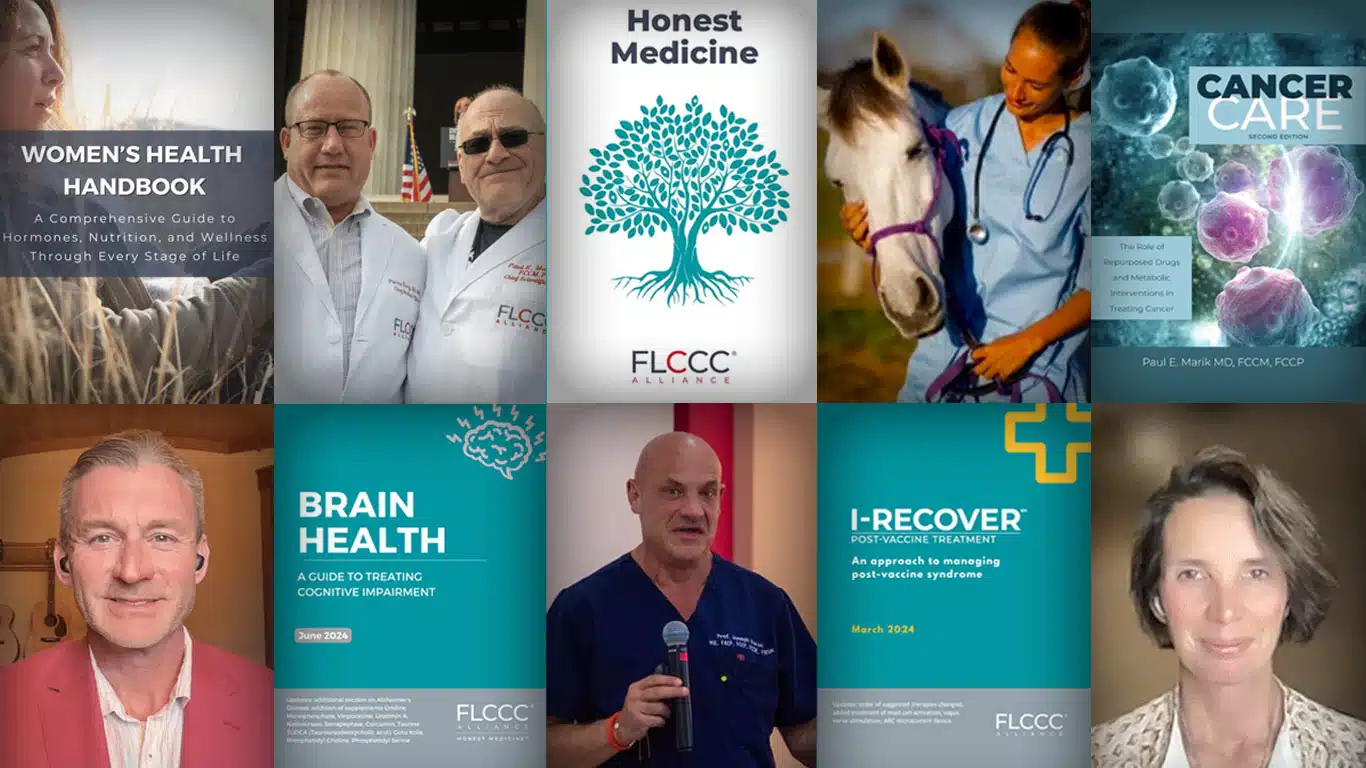A guest post from Dr. Suzanne Gazda, who will speak at FLCCC’s third educational conference February 2-4 in Phoenix, Arizona.

If you’re a regular reader here, you’ve likely seen our previous articles concerning the importance of getting enough vitamin D. As much as we and many clinicians talk about it, deficiency of this critical nutrient still affects an estimated 35 percent of adults in the United States and is one of many modifiable lifestyle factors that appear to increase the risk of early onset or late dementia diagnosis.
But vitamin D deficiencies are hardly a problem unique to this country – it’s also a global concern linked to significant health consequences, including obesity, diabetes, hypertension, and neurodegenerative disorders such as Alzheimer’s.
In order to address these deficiencies, we have to look more closely at the underlying reasons such as:
- Our inside-oriented lifestyles, whether we’re working, attending school, or watching television on the weekends. We have essentially become the Indoor Generation!
- Our regular use of sunscreens.
- Tinted windows at home or in vehicles.
- Wearing clothing designed to block the sun that also effectively blocks UVB or ultraviolet B light – even in the summer. UVB radiation is necessary for our body’s synthesis and production of vitamin D.
Note that individuals who have more melanin in their skin, are obese, older, or consistently avoid the sun are potentially more at risk of a deficiency in the absence of high-quality supplementation.
What about the role of vitamin D in brain health?
Vitamin D plays several vital roles in normal brain physiology, including modulating synaptic plasticity. Synaptic plasticity refers to the ability of neurons to modify the strength of their connections. It is estimated that we have approximately one billion neurons and trillions of synaptic connections, and it is imperative that the lines of communication interact both efficiently and effectively for our neural processes.
But a vitamin D deficiency can impact this synaptic plasticity through numerous avenues, including l-type voltage-gated calcium channels and regulation of various neurotransmitters, including nitric oxide. Additionally, vitamin D deficiency appears to render neurons more vulnerable to injury.
In 2014, researchers identified more evidence supporting the importance of vitamin D in regulating the release of nerve growth factor (NGF), an essential molecule for the neuronal survival of hippocampal neurons as well as cortical neurons.
A very large study recently published in JAMA Neurology again points to the importance of vitamin D for brain health. The UK Biobank research is the most expansive of its kind, analyzing data from over 356,000 people under the age of 65 and identifying 15 lifestyle and health risk factors associated with early-onset dementia. In addition to vitamin D deficiency, other risk factors include high levels of inflammatory C-reactive proteins, specifically in women, orthostatic hypotension (a form of low blood pressure that happens when standing up from sitting or lying down), heart disease, depression, and other potentially modifiable issues.
Significant results shown with vitamin D supplementation.
Published research in 2023 revealed findings that among those who developed dementia within ten years, about 75 percent were non-supplement takers compared to only 25 percent who regularly took vitamin D supplements. Supplementation provided greater protection for women, though it reduced dementia risk in both sexes, with researchers noting that “vitamin D exposure was associated with significantly longer dementia-free survival and lower dementia incidence rate.”
A 2022 investigation included decedents of the Rush Memory and Aging Project (MAP) and measured vitamin D concentrations in four brain regions both ante-mortem and postmortem. Study authors found higher brain 25(OH)D3 concentrations were associated with a 25 to 33 percent lower odds of dementia or mild cognitive impairment (MCI) in subjects at the final visit before death. Low levels of vitamin D are also associated with reduced gray matter, where over 90 percent of our neurons are located, which can fuel cognitive impairment.
What can we do to optimize our brain health?
We recommend The Bredesen Protocol, which focuses on modifiable risk factors for dementia and cognitive health based on healthy lifestyle and dietary choices including:
- Nutritional approach that consists of whole, fresh foods (organic when accessible) and eliminating highly processed foods.
- Intermittent fasting; also, see my webinar with Dr. Paul Marik on intermittent fasting.
- Exercise
- Quality sleep, ideally 7 to 8 hours nightly
- Stress reduction
- Neuroplasticity
- Ample vitamin D through sunlight and/or supplementation to achieve an optimum level of 60 to 100 ng/mL (nanograms per milliliter)
While regular sun exposure is the most natural way to get our D, the daily demands of life sometimes get in the way! And the amount of time and percentage of exposed skin it takes to get enough vitamin D will vary based on geographics, weather conditions, and even the amount of melanin your skin contains. Generally, we should strive for 10 to 30 minutes of midday sunlight, several times per week; people with darker-skinned complexions may need to spend a little more time than this. But of course, individuals who are fairer-skinned or burn easily will likely have been told to wear sunscreen. My advice is that we also regularly take a high-quality vitamin D3 supplement ideally with a meal containing some fats to ensure the greatest absorption.
Additionally, there are several other supplements to consider as part of a brain health program that we will discuss soon in an upcoming blog. For other related reading, please check out a few of our previous articles:
https://www.suzannegazdamd.com/blog/vitamin-d-deficiency-is-it-another-health-crisis-in-the-making
https://www.suzannegazdamd.com/blog/more-studies-point-to-critical-importance-of-vitamin-d-in-immune-health
If you’ve been told you are deficient in vitamin D, there are a number of steps you can take to improve your levels. And as you can see, there are many, many reasons why we all need to be very proactive – our brains and our bodies depend on it! Questions or need to schedule an appointment? Just reach out to our offices and let us know how we can help.
In hope and healing,
Dr. Suzanne Gazda
Learn more:
References:
Holick, M., Chen, T.C. Vitamin D deficiency: a worldwide problem with health consequences.
The American Journal of Clinical Nutrition. 2008. https://www.sciencedirect.com/science/article/pii/S0002916523235935
Naeem Z. Vitamin d deficiency- an ignored epidemic. Int J Health Sci (Qassim). 2010;4(1):V-VI.
https://www.ncbi.nlm.nih.gov/pmc/articles/PMC3068797/
Mayne, P., Burne, T. Vitamin D in Synaptic Plasticity, Cognitive Function, and Neuropsychiatric Illness. Trends in Neurosciences. 2019. https://doi.org/10.1016/j.tins.2019.01.003
Anjum I, Jaffery SS, Fayyaz M, Samoo Z, Anjum S. The Role of Vitamin D in Brain Health: A Mini Literature Review. Cureus. 2018;10(7):e2960. Published 2018 Jul 10. doi:10.7759/cureus.2960
https://www.ncbi.nlm.nih.gov/pmc/articles/PMC6132681/
Gaughran F, Stringer D, Wojewodka G, et al. Effect of Vitamin D Supplementation on Outcomes in People With Early Psychosis: The DFEND Randomized Clinical Trial. JAMA Netw Open. 2021;4(12):e2140858. doi:10.1001/jamanetworkopen.2021.40858. https://jamanetwork.com/journals/jamanetworkopen/fullarticle/2787456
Hendriks S, Ranson JM, Peetoom K, et al. Risk Factors for Young-Onset Dementia in the UK Biobank. JAMA Neurol. Published online December 26, 2023. doi:10.1001/jamaneurol.2023.4929
Ghahremani M, Smith EE, Chen HY, Creese B, Goodarzi Z, Ismail Z. Vitamin D supplementation and incident dementia: Effects of sex, APOE, and baseline cognitive status. Alzheimers Dement (Amst). 2023;15(1):e12404. Published 2023 Mar 1. doi:10.1002/dad2.12404
Shea MK, Barger K, Dawson-Hughes B, et al. Brain vitamin D forms, cognitive decline, and neuropathology in community-dwelling older adults. Alzheimers Dement. 2023;19(6):2389-2396. doi:10.1002/alz.12836
Raman, R. How to Safely Get Vitamin D From Sunlight. Healthline.com. 2023.
https://www.healthline.com/nutrition/vitamin-d-from-sun#time-of-day





